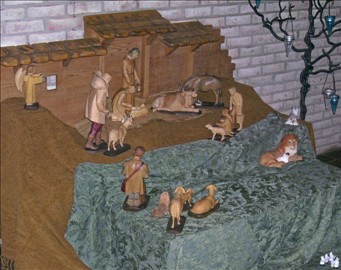 When the angel Gabriel announced to Mary that the child she was about to conceive in her womb would be the heir of the House of David, making him a second David, one might have thought that the child would be named David after his forebear. But the angel said the child should be named “Jesus” and he was given that name when he was circumcised on the eighth day.
When the angel Gabriel announced to Mary that the child she was about to conceive in her womb would be the heir of the House of David, making him a second David, one might have thought that the child would be named David after his forebear. But the angel said the child should be named “Jesus” and he was given that name when he was circumcised on the eighth day.
This name tells us that not only was this child another David, a fulfillment of what royalty means in the eyes of Jesus’ heavenly Abba, but another savior. How so? In the many times that Israel’s God Yahweh was called a “savior,” there was usually an act of violence. That is, God “saved” God’s people by defeating the enemies who were oppressing Israel. In some cases, as in the Psalms, an individual was delivered from a violent mob. More often than not, the delivered victim called on God to commit violence on the oppressors. But saving God’s people in that way didn’t change the violent structure of human culture.
The name Joshua, Jesus’ earlier namesake, means”Yahweh saves.” Joshua “saved” Israel by violently destroying the peoples of Canaan. But just as Jesus was to prove to be a different, even contrary king than David, Jesus was to be a different, even more contrary savior. To the disappointment of many, Jesus did not “save” Israel by scattering the Roman armies and ruling in Caesar’s stead. (See The Naming of Jesus.)
Come Easter, we will see that Jesus saves by dying on a cross. That’s an odd way to save anybody. Perhaps it is that oddity that led to the notion that God saved us by suffering our punishment. But God was not suffering our punishment, Jesus was suffering from human violence in order to save us from our violence. It isn’t the crucifixion in itself that saves us from our violence but the Resurrection and, crucially, Jesus’ forgiveness that saves us from our violence.
If it is by forgiveness and not violence that Jesus saves us, then we cannot participate in Jesus’ gift of salvation though violence but only through forgiveness. By forgiveness, Jesus has given us an escape route from our own vengeful rage if we are willing to take it. We are inclined to shrink from this challenge when we think about how vulnerable that makes us. We would rather use our rage to seek out the vulnerability of others. Can we, instead, take heart and take the risk by recalling how vulnerable Jesus was as a baby born into a violent and vengeful world?

 The celebration of the birth of Jesus is a time to put all political differences aside in glad agreement that this child is born. I wish! I have pointed out many times over the years when preaching on Luke’s nativity story that it puts political issues front and center, forcing us to confront our political realities if we are to confront the Gospel.
The celebration of the birth of Jesus is a time to put all political differences aside in glad agreement that this child is born. I wish! I have pointed out many times over the years when preaching on Luke’s nativity story that it puts political issues front and center, forcing us to confront our political realities if we are to confront the Gospel. When the angel Gabriel announced to Mary that she was to conceive and bear a son, the angel said that her son “will be great, and will be called the Son of the Most High, and the Lord God will give to him the throne of his ancestor David. He will reign over the house of Jacob forever, and of his kingdom there will be no end.” (Lk. 32–33) However, the prophet Nathan made this same promise to King David: “Your house and your kingdom shall be made sure forever before me; your throne shall be established forever.” (2 Sam. 7: 16) Likewise, Psalm 89 say that David’s “line shall continue forever, and his throne endure before me like the sun. It shall be established forever like the moon, an enduring witness in the skies.” (Ps. 89: 36–37)
When the angel Gabriel announced to Mary that she was to conceive and bear a son, the angel said that her son “will be great, and will be called the Son of the Most High, and the Lord God will give to him the throne of his ancestor David. He will reign over the house of Jacob forever, and of his kingdom there will be no end.” (Lk. 32–33) However, the prophet Nathan made this same promise to King David: “Your house and your kingdom shall be made sure forever before me; your throne shall be established forever.” (2 Sam. 7: 16) Likewise, Psalm 89 say that David’s “line shall continue forever, and his throne endure before me like the sun. It shall be established forever like the moon, an enduring witness in the skies.” (Ps. 89: 36–37)